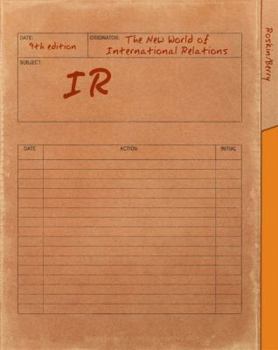IR: The New World of International Relations
Select Format
Select Condition 
Book Overview
For courses in International Relations Theory A down-to-earth approach to contemporary international relations IR: The New World of International Relations helps students understand how the global... This description may be from another edition of this product.
Format:Paperback
Language:English
ISBN:0205079490
ISBN13:9780205079490
Release Date:February 2011
Publisher:Longman Publishing Group
Length:375 Pages
Weight:1.20 lbs.
Dimensions:0.6" x 7.3" x 9.0"
Customer Reviews
4 ratings
Has anyone here actually read the entire book?
Published by Thriftbooks.com User , 14 years ago
Yes the book is written in a casual tone. Yes there is a focus on American foreign policy toward other nations for several of the chapters; hard not to bring it up when discussing the Cold War, Vietnam, or U.S. nuclear policies. However so many chapters focus Israel-Palestine, globalization, effects of colonialism, or why wars happen. This book is aimed at American students looking for a career path in International Relations so it is desirable to focus on U.S. foreign policy. However it does often focus on State A's history and State B's history (Israel-Arab states, Iran-Iraq, Pakistan-India) before explaining what the result of an attack from State A would mean to State B. If A does X and B does Y, it would result in State C doing Z (e.g. the U.S. and USSR mutually stopping munition supplies to end the 1973 war between Israel-Egypt and Syria) Those claiming this book to be right-wing must have really not read much of the book. Each chapter ends with a bibliography, most sources being scholarly journals and foreign policy journals, policy papers, books et al. I see Paul Krugman, Tom Friedman, George Soros, Richard Holbrooke, Richard Clarke as sources. Not exactly far right sources. I saw John Bolton on the right and a few others, not many. The book raises the question of the problems of global warming, running out of oil (and foreign policy implications). The approach on the first, second, and third gulf wars shows what could never be argued as right wing bias. The chapter opens with the ancient history, the imperialized history, discusses the U.S.'s poor relations with Iran, mentioning our aiding of Saddam, how Cheney argued against a full-invasion of Iraq in the second gulf war only to contradict himself. The section on the third gulf war is too brief in my opinion but it includes "By late 2001, Bush 43 also decided to oust Saddam in Iraq...This time most of the world opposed us...Bush exaggerated and oversold Iraq's WMD capacity." There is no right-wing bias in this book, most of it is rather centrist or left-leaning. For some the causal "talking" tone of the book, some may find it detracting. I found it to be more engaging, even if the author has to make casual assessments like "The Middle East was angrier than ever." after explaining how the Iraq war created more jihadists. Is making the simple observation that the Middle East is currently (with plenty of reason) pissed at the U.S. really all the subjective? The book itself covers alot within 350 pages, some sections are far too terse given that the book has 22 chapters. The book serves as a good base guide for many topics and works well if the professor is engaging with more material or additional reading. I never write reviews but I was shocked to see the book rated so low. If any of the other reviewers actually looked at the sources or analyzed the text of the main content they would find it to be informative. Maybe they have incompetent or right-wing professors? I know it has pro
Textbook but doesn't read like one.
Published by Thriftbooks.com User , 18 years ago
Got this for a required college course. Found it superbly readable. The authors don't write like textbook authors. They write like reporters who like to dig deep. If you're a news junky, get this book. If you're assigned it for college, be happy.
A Good Start
Published by Thriftbooks.com User , 18 years ago
The New World of International Relations is a good introductory book to the field of Political Science and International Relations. It presents information in a general and an understandably American way. It's not overbiased, but is written by Americans for American political views, general knowledge and understanding of current events, etc. It provides a good start for those who are looking for a good start into the ever-expanding knowledge base of Political Science
A good place to start.
Published by Thriftbooks.com User , 19 years ago
What I like about this book is that it is short, it is readable, and it introduces the unitiated reader quickly and broadly to various thinkers and models of IR and does so in historical context. I agree with the others that it definitely has some phrases which are unusual for a textbook. Random opinion, or generally unacademic phrases here and there. This is defintely a detractor, but also makes the book a bit fun. About the perspective of the author. I personally am conservative and so I was looking for a book which would help me grasp the subject from a more conservative viewpoint than the average fare. However, I would not call it conservative, I would call the book fairly centrist. While the book does view the world from an overtly American perspective and it also does not ignore conservative ideas such Huntington's "Clash of Civilizations" model of geopolitics- I would still call it centrist rather than conservative. A conservative for example, would give pre-eminence to Reagan's place in the cold war, this one does not. If you happen to be against American foreign policy, pro-UN, etc, this book will definitely upset you, as it did other reviewers here.






